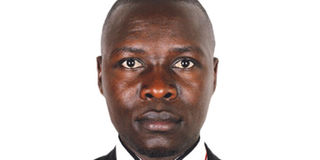Community engagement key in addressing refugee health needs

Frank Ategeka
What you need to know:
Combined effort. Whereas UNHCR, government of Uganda and other humanitarian agencies have done a great job in addressing health needs for the persons of concern, there is need to build more partnerships between private, national, regional and global agencies towards supporting refugee health needs as we strive to achieve Universal Health Coverage by 2030.
On December 12, the world commemorated the International Day on Universal Health Coverage under the theme: “Unite for universal health coverage, now is the time for collective action.”
Universal Health Coverage (UHC) means all people and communities receive the health services they need without suffering financial hardship. The United Nations formally set December 12 every year as the UHC day and it was first recognised in 2017, with a UHC forum held in Tokyo, Japan.
The UHC2030 – the health system platform that promotes multi-stakeholder collaboration for universal health coverage, was formed to advance global efforts towards achieving UHC by 2030. This means every person, wherever they are, should be able to access and afford quality health services by 2030. The publication of new data in the Tracking Universal Health Coverage: 2017 Global Monitoring Report, revealed that at least half of the world’s population still lacks access to essential health services and that about 100 million people are pushed into extreme poverty each year due to their health expenditures.
According to the report, although they may have access to some health services, more than half of the world’s 7.3 billion people do not receive all of the essential health services they need. Essential health services encompass everything from health promotion to prevention, treatment, rehabilitation and palliative care throughout the course of a lifetime. These include neonatal, child, adolescent and maternal health, sexual and reproductive health, infectious diseases, non-communicable diseases and more.
Additionally, more than 800 million people spend at least 10 per cent of their household budgets on health care, and about 100 million people are pushed into extreme poverty due to their health expenditures.
What does this mean to an ordinary person across the world? It means if one’s household annual budget is $1,000 (about Shs3.7m), they spend at least $100 (about Shs371,000) on health care expenditures.
With this, one may not explicitly understand the adverse effects of huge health expenditures on one’s life. Now consider an ordinary person who is unemployed or with seasonal employment in the informal sector. The annual household income is usually very small to cover all their expenditures. There are situations where a person has no job for six months, especially in developing countries. What does this mean as it comes to paying for health services? It means that person will spend more than they earn on health care services. To balance this, such a person is drawn into debts to settle the huge health expenditures thus being pushed into extreme poverty.
To exacerbate the situation, such challenges fall hardest on vulnerable persons such as refugees, who leave all their businesses, income-generating activities and investments in their home countries.
With Uganda currently hosting more than one million refugees from several countries, there is need for stakeholders’ engagement for increased support for refugee health needs to achieve UHC by 2030. As part of the global effort to support refugees, Uganda hosted Solidarity Summit on refugees on June 21 and June 22, 2017 and the world gathered in Uganda to stand in solidarity with the country.
The summit, hosted by President Museveni and the United Nations Secretary General Antonio Guterres, raised more than $350m (about Shs 1.2 trillion) to support the refugee crisis in Uganda. Of course health services support for the refugees was among the many social aspects that could be addressed by this commitment. This was a great multistakeholder engagement towards supporting refugees globally.
Uganda’s integrated refugee response incorporating host communities has been named as the model for the Comprehensive Refugee Response Framework (CRRF), adopted in the September 2016 Summit for Refugees and Migrants in New York, US. This makes Uganda a frontline State for this new approach.
Whereas UNHCR, government of Uganda and other humanitarian agencies have done a great job in addressing health needs for the persons of concern, there is need to build more partnerships between private, national, regional and global agencies towards supporting refugee health needs as we strive to achieve UHC by 2030. This means more partners (both private and public, profit and not-for-profit) need to engage in supporting refugee health needs through increasing community awareness on UHC and calling upon stakeholder cooperation to support refugee health needs to ensure no one is left behind.
As more activities were held across the world in commemoration of the UHC day, Rural Aid Foundation in conjunction with Inter Aid Uganda and Global Health Corps contributed to the attainment of the first UHC strategic advocacy pillar: Build political support and grassroots demand for UHC at the country level to motivate policies and investments that aim to leave no one behind by engaging the refugee community, community leaders, Civil society organizations, humanitarian agencies and private partners on universal health coverage to increase support for refugee health needs.
As endorsed in the UHC2030 Global Compact, two key principles will broadly be fulfilled, including; leaving no one behind-a commitment to equity, non-discrimination and a human rights based approach and making health systems everybody’s business with engagement of citizens, communities, civil society and private sector.
With this, we shall contribute to the global strategy of achieving UHC by 2030. One key thing to note is that achieving UHC will contribute to the achievement of SDGs and this justifies why every country globally should work towards achieving UHC by 2030.
Ategeka is a global health Corps fellow in Uganda.


